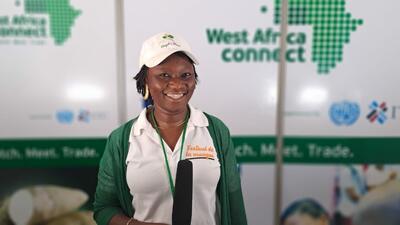Strengthening entrepreneurs through Information Technologies
In Benin, an ITC project is connecting fruit processors with suppliers and buyers through a supply-chain wide ‘virtual market place’ that connects product offers to demand through connected devices.
One person standing to benefit is
Ms. Aminatou Bagoudou, who produces pineapple fruit juice at her home in
Cotonou, Benin. Pineapple juice is her main product and generates income for
her family, but, as for many other women engaged in the processing industry,
she is hindered by a shortage of empty bottles. If she were able to collaborate
with her peers to combine purchases she would be able to source bottles from
abroad, but she lacks the time and financial resources to
locate the necessary contacts. She also does not know how many bottles she
would need to buy to get a competitive price.
The ITC system offers three features
important to small producers and traders:
• More visibility;
• Ease of contact with businesses of interest (buyers for sellers and vice-versa);
• Support for small business owners to assess their opportunity to act as a group (e.g. to access economies of scale).
Indeed, when they combine their requests for inputs and offers for buyers, small businesses can achieve volumes that put them in a better bargaining position. The business-matching system enables them to source products at more competitive prices and attains pineapple juice volumes that can open new markets, both in Benin and neighbouring Nigeria.
A geo-location system shows the area from which requests were sent. Requests are consolidated and displayed on an online map. Internet users, such as larger buyers and exporters, can then assess the geographic distribution of the juice producers and the effort required to collect their production. To assist Ms. Bagoudou and her peers, bottle resellers will be able to estimate the best way of purchasing bottles in bulk.
The challenges of implementation begin with finding the right local IT capacities and solid institutional partners, and making a good business case to leading telecom operators. There is a risk that institutional stakeholders will compete for system ownership. This must be managed, ensuring that the system administrator’s ability to cover costs is protected.
The launch of a business-matching system is best achieved through a well-communicated kick-off date and event. Users want a system that works for them up front. This requires a critical mass of buyers reading current offers quickly, especially for perishable goods. A well-targeted marketing campaign, in cooperation with the telecom partners, can be decisive. Additionally, new subscribers can be encouraged to list in an online business directory with a geo-location capability that offers small businesses better exposure to build sales.
There is uneven use of technologies in the pineapple supply chain. Exporters generally have their own computer and smart phones, but processors, small traders and producers mostly rely on basic cell phones. ITC’s e-business team proposes to link all relevant technologies (SMS, mobile application, web) by sharing the same database. Offers sent by SMS are available on the web and to smart phone users in a few seconds.
While this project addresses the business needs of participants in a specific supply-chain, the system can provide similar features for other agribusiness sectors in Benin. Indeed such virtual market places are equally applicable to all small agribusinesses and processors.














